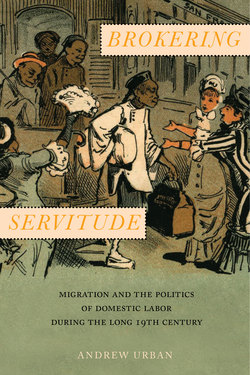Читать книгу Brokering Servitude - Andrew Urban - Страница 8
На сайте Литреса книга снята с продажи.
ОглавлениеACKNOWLEDGMENTS
The doctorate program in History at the University of Minnesota nourished me with a vital intellectual and activist community. I am grateful to Anna Clark and Doug Hartmann for all of their support and feedback. Kevin Murphy is a dear friend and role model. His commitment to the public humanities as a basis for critical social engagement continues to inspire me. My advisors Donna Gabaccia and Erika Lee put me on the right path, and their imprint can be seen throughout this book. I can only hope I have done justice to the education I received from them. To this day, I still count on both Donna and Erika for support and encouragement.
At Emory University, Leslie Harris’s impact as a mentor cannot be properly qualified. The chance to work with the innovative Transforming Community Project was a formative experience.
There are so many colleagues and friends who helped me along the way. My apologies for any omissions.… I would like to thank Isra Ali, Bob Barde, Al Barrion, David Brecher, Candace Chen, Frances Chen, Janna Emig, Heather Fife, Lucas Klein, Nelson Lichtenstein, Allison Lorentzen, Heather Lukes, David Madden, Jeff Manuel, Molly McGarry, David McNeill, Brighde Mullins, Peter Philips, Eric Richtmyer, Maggie Russell-Ciardi, Liz Sevcenko, Michael Sullivan, Evan Taparata, Julia Thomas, Katie Tsuji, Sue Urban, Amity Wilczek, and Aaron Windel.
Nicole Heater deserves a special line of thanks for the years of patient support that she offered me. This book would not have been possible without her help.
I would like to thank Bill Creech and Angela Tudico of the National Archives.
I have benefitted from opportunities to present my book at a number of workshops and conferences. These include the United States in the World writing group at NYU, whose core members Justin Jackson, Augustine Sedgewick, and David Singerman were close readers and commenters. I was fortunate to have participated in two meetings of the International Conference of Labour and Social History, and I am grateful for the comments and feedback that I received from Dirk Hoerder, Elise van Nederveen Meerkerk, and Silke Neunsinger, who edited the volume Towards a Global History of Domestic and Caregiving Workers. I would also like to thank the contributors to the edited volume Making the Empire Work, who gathered at the University of Toronto. In addition, I acknowledge the James Weldon Johnson Institute at Emory, the Global Race, Ethnicity, and Migration workshop at the University of Minnesota, and Mae Ngai and the Weatherhead East Asian Institute at Columbia University. As an American Council of Learned Societies New Faculty Fellow, I had valuable time to work on this project.
Rutgers has been an incredibly supportive environment and an inspiring place to work. I would like to thank, in particular, Louise Barnett, Carolyn Brown, Kornel Chang, Dorothy Sue Cobble, Ann Fabian, Leslie Fishbein, Doug Greenberg, Allan Isaac, Kathy López, James Masschaele, Lou Masur, Meredith McGill, Andy Parker, Jamie Pietruska, Nancy Rao, Kyla Schuller, Ben Sifuentes-Jáuregui, Judith Surkis, Jimmy Swenson, Mark Wasserman, and Ginny Yans.
Support from the Rutgers University Research Council allowed for the inclusion of color images in this book.
Dan Bender and Kim Phillips have provided wonderful encouragement as series editors. Dan in particular has been a mentor to me in all aspects of my career. NYU Press has diligently ushered this book toward completion. Deb Gershenowitz and Constance Grady were my editors when I began, and offered important help getting things off the ground. Clara Platter and Amy Klopfenstein have been resourceful, candid, and insightful in seeing the book to its completion. Dorothea Halliday, NYU Press’s managing editor, coordinated copyediting and production with precision and awareness of the various tenure-related deadlines I faced.
Last but not least, there are individuals whom I can never adequately thank. But I will try. Caley Horan offered editing help at a crucial juncture, and I am indebted to her for this timely intervention and for her support throughout. At Rutgers, Johanna Schoen read the book manuscript in its entirety and provided me with focused comments and suggestions. As my readers for NYU Press, Eileen Boris and Micki McElya provided two rounds of crucial feedback, each time pushing me to broaden the scope of my thinking. They have inspired me not only with their insights, but with their willingness to spend so much time helping a junior colleague. I can only hope that in the future I can replicate this commitment—and the generosity that inspires it.
My sister Claire, an immigrant rights lawyer, was a vital source of help in comparing past to present and in making sense of change over time. Where such change exists.…
My dad, Ted, has supported this project from day one. Whenever I seemed poised to lose it he helped with whatever needed helping, and brought me back down to earth. I am forever grateful.
This book would simply not be without my mom, Janet. Not only did she read the manuscript in its entirety and help to copyedit, she provided vital assistance in respect to cropping, formatting, and improving the resolution of the images that appear here. She has supported me with every aspect of this book—and in life—and I cannot thank her enough.
